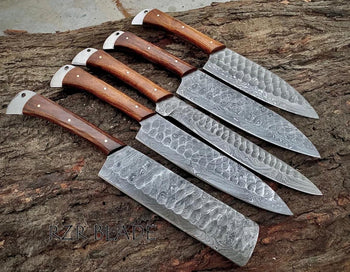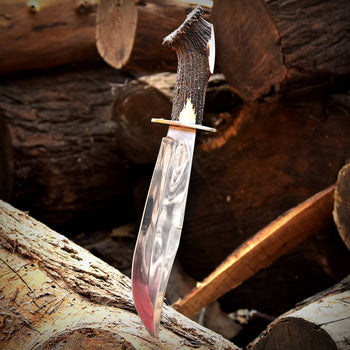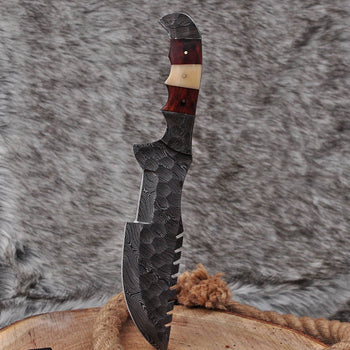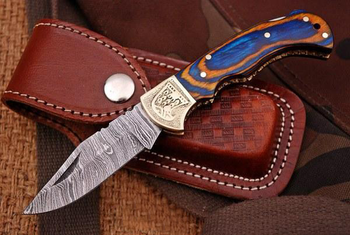When it comes to high-end knives, few can match the beauty, history, and performance of Damascus steel. Known for its wavy, water-like patterns and superior strength, Damascus steel has fascinated collectors and knife enthusiasts for centuries.
But what exactly makes a Damascus steel knife a prized possession in a collector’s cabinet? In this post, we explore why these knives are more than just tools—they're timeless pieces of art.
A Brief History of Damascus Steel
Damascus steel dates back to ancient times, believed to have originated in the Middle East around 300–500 AD. Named after the city of Damascus in Syria, the original Damascus steel was made from a type of steel called Wootz, imported from India.
The secret behind its unique patterns and formidable strength was lost around the 18th century, but modern blacksmiths have revived and even improved the technique through pattern welding.
Today's Damascus steel knives are crafted by folding and forging layers of different steels together, producing a distinctive blade that combines durability with elegance.
The Allure of the Pattern
What makes Damascus steel knives immediately recognizable is their mesmerizing pattern. These swirling designs are not merely aesthetic; they’re a result of multiple layers of steel being folded and hammered together.
For collectors, no two Damascus blades are exactly alike. The pattern becomes a kind of fingerprint, giving each knife a unique identity. Some popular patterns include raindrop, ladder, twist, and feather, each offering its own visual appeal.
Unmatched Craftsmanship
Damascus knives often represent the pinnacle of knife-making craftsmanship. Skilled artisans spend hours—sometimes days—creating a single blade. From the forging process to the handle design, every step involves meticulous attention to detail. This makes Damascus knives not only functional tools but also heirloom-quality pieces.
Many custom knife makers use exotic handle materials such as stabilized wood, bone, or even mammoth ivory, further enhancing the collectible value of the knife.
Superior Performance
Beyond aesthetics, Damascus knives are valued for their exceptional performance. The layering of different steels allows these knives to have a flexible yet hard blade—ideal for maintaining a sharp edge without becoming brittle.
Collectors who also use their knives in the kitchen or the outdoors appreciate their edge retention and resistance to chipping. A properly made Damascus knife can slice through tough materials effortlessly while maintaining its sharpness longer than many other types of blades.
Investment Value
High-quality Damascus steel knives can appreciate in value over time, especially if made by a renowned bladesmith or as part of a limited-edition series. Collectors often view these knives as functional investments. Just like fine watches or classic cars, a rare Damascus knife with a known provenance can become a valuable asset.
Limited-run or custom-made knives, especially those featuring premium materials and unique patterns, are highly sought after in the collector’s market. Some collectors even focus on acquiring knives from specific makers whose reputations continue to grow.
Versatility of Collection
One of the great things about collecting Damascus steel knives is the variety. Whether you're into hunting knives, kitchen knives, folding knives, or ceremonial blades, there's a Damascus version for nearly every category. This allows collectors to build a diverse portfolio while maintaining a consistent aesthetic.
Additionally, the cultural significance of Damascus steel across different regions—from Japanese chefs to American hunters—adds layers of storytelling to any collection.
Caring for a Damascus Knife
To maintain the beauty and functionality of a Damascus knife, proper care is essential. Although these knives are more resistant to rust than carbon steel blades, they are not entirely stainless. Regular oiling and careful storage are recommended to prevent corrosion.
Avoid using abrasive cleaners or dishwashers, and always dry the blade thoroughly after use. For collectors, preserving the original finish is key to maintaining both value and visual appeal.
Damascus steel knives stand at the crossroads of art, history, and high-performance utility. Their unique patterns, historical roots, superior edge retention, and handmade artistry make them a must-have for serious collectors.
Whether you're displaying them in a glass case or using them in the kitchen or field, Damascus knives tell a story that transcends generations.
If you're just starting your knife collection or looking to add a standout piece, shop high quality Damascus steel knife only from a trusted knife supplier in USA - AJ SANITY.








![Why American Home Cooks Are Upgrading to Damascus Knives in 2025 [Top Reasons]](http://aj-sanity.com/cdn/shop/articles/DSC_5898_837e6509-a932-4060-9845-2f1397754cda.webp?v=1745686270&width=100)
